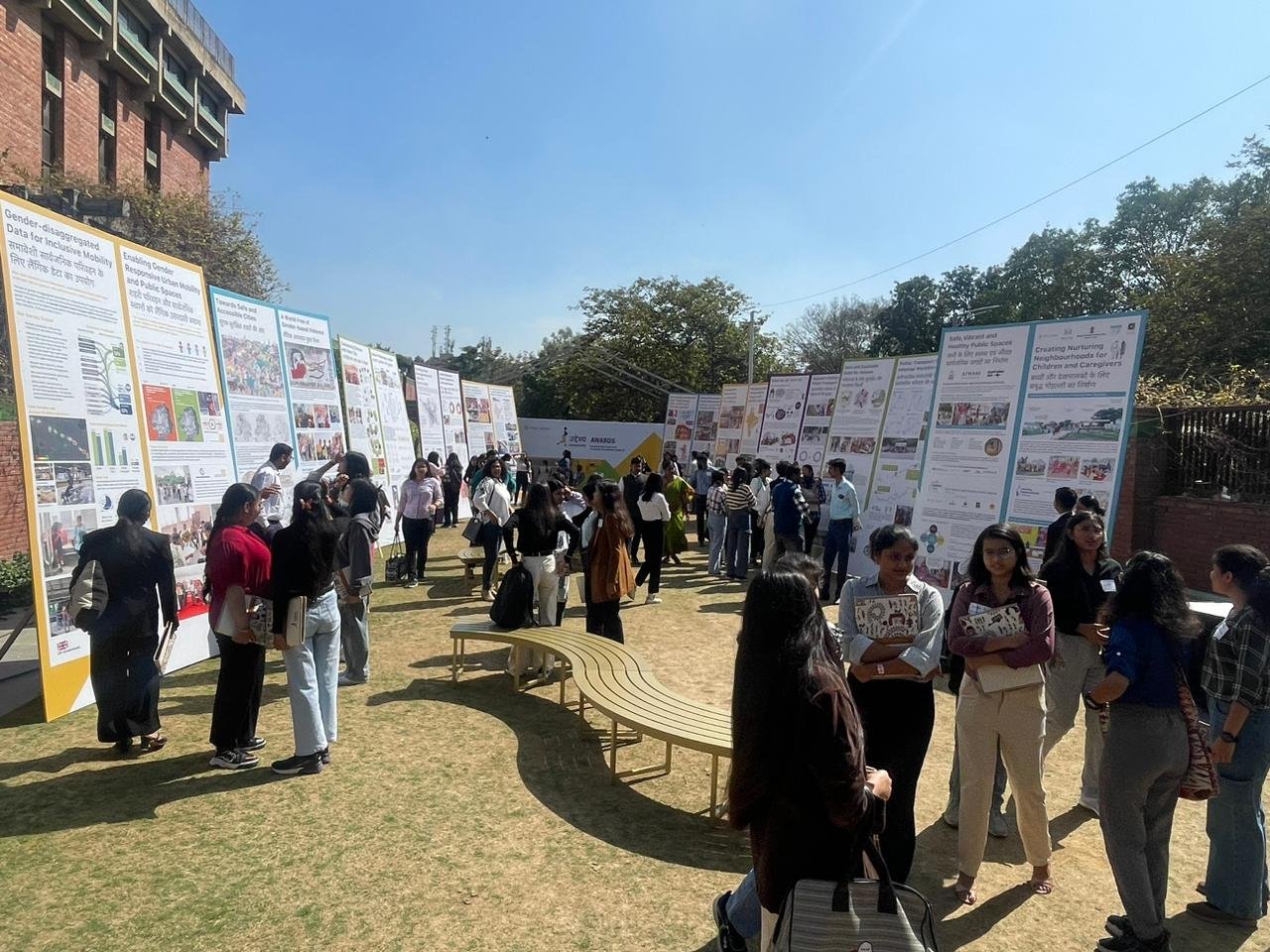EVENT RECAP: Uddheshya: Towards Gender Responsive Urban Mobility Systems
Hosted under the Forum for Decarbonising Transport
.
Hosted under the Forum for Decarbonising Transport .
About Uddheshya
Uddeshya is WRI India’s annual gender and mobility convening under the aegis of the Forum for Decarbonising Transport, a NITI Aayog-led platform that is part of the NDC Transport Initiative for Asia (NDC-TIA) which enables more ambitious and inclusive transport decarbonization action.
Organized on 4th March 2024, Uddeshya convened a dynamic gathering of gender experts, transport agencies, research organizations, students, innovators, and civil society groups to spotlight inclusive mobility as a powerful catalyst for decarbonizing transport. The conference saw a full day of engaging conversations, a specialized masterclass for urban planners, an award ceremony recognizing and celebrating people who have contributed significantly to advance gender-responsive mobility, and an exhibition of over 20+ innovative projects focused on inclusive urban mobility initiatives.
Conference Attendees
The plenary session 'Envisioning an Inclusive and Equitable Clean Mobility Transition’ moderated by Jaya Dhindaw, Executive Director, Cities, WRI India, featured Dr. Hanif Qureshi IPS (Additional Secretary, Ministry Of Heavy Industries), Liane Randolph (Chair, California Air Resources Board), Ines Sanchez de Madariaga (UNESCO Chair on Gender), Christian Kapfensteiner (Project Director, Deutsche Gesellschaft für Internationale Zusammenarbeit (GIZ) GmbH) and Adriana de Almeida Lobo (Managing Director, Global Presence and National Action, World Resources Institute) who highlighted the criticality of inclusion and equity in our transition to clean mobility.
Five key takeaways from Uddheshya 2024:
-
Transforming urban mobility systems begins by engaging with the end users of transport. Local community engagement is essential to capture the heterogeneity of demographic profiles, travel needs, purchasing power and mobility patterns. Civil society organizations (CSOs) are critical in bridging the gap between communities and policymakers. Strengthening their capacities and participation in transport planning and governance will help plug systemic gender gaps in urban mobility systems.
-
Women’s inclusion in the transport workforce is not just a moral imperative but a tool for economic growth, innovation and sustainable transition of the transport sector. As automobile manufacturers, transport operators and policymakers begin to recognize these gains, they need to be sensitized and equipped to support women’s representation in diverse roles within the industry. The government, industry, civil society and academia must work together to remove policy barriers, provide skill training and help women overcome social barriers to achieve this transition.
-
Formalizing the gender-responsive approach in urban mobility systems requires institutional support. While infrastructure systems are typically slow to change, integrating gender considerations in service delivery can be achieved more quickly. However, for the long-term integration of the gender lens in urban mobility systems, cities need to constitute gender committees, regulatory mechanisms, dedicated budgets and monitoring systems.
-
Technology and data-based resources are powerful tools that provide short- and long-term gender-responsive mobility solutions. Gender-disaggregated mobility data has played a crucial role in capturing, quantifying and representing gendered differences in travel patterns, enabling decision-makers to formulate suitable policies. Technological innovation has supported this transformation through data collection, safety audits, and information dissemination and enabled the creation of tech-based mobility solutions. Harnessing technological advancements and embedding gender considerations in their development is crucial to catalyze the shift towards gender-responsive mobility systems.
Moving in their Shoes
'Moving in Their Shoes' exhibition highlighted gender-responsive urban mobility initiatives in India. It showcased over 20+ projects driving inclusivity in the transport sector. Additionally, a masterclass session, aimed at mainstreaming gender in urban infrastructure planning, was organized where experts shed light on practices that promote accessibility and gender sensitivity in Indian cities.
Sheroes
At Uddheshya 2024, many visionary women and organizations shaping inclusive transport in India were celebrated. The Sheroe awardees were women who stood up to heavy odds to become role models for other women and girls looking to make their mark in the mobility space. The winners were representative of various areas of the transport sector - Rujuta Dattatray Khedekar - an electric vehicle technician with Piaggo, Nagalakshmi SP- a trainer for driving autos with Namma Yatri, Saritha Ramkoti -the first bus driver of Delhi Transport Corporation, Vaidehi Vinod Ankolekar - a bus conductor with Brihanmumbai Electricity Supply and Transport Undertaking, Reshma CA and Anu Suresh, auto pilots from Kochi Metro Rail Corporation and Vinutha VB an auto pilot with Bangalore Metro Rail Corporation Limited.
The other awardees included organizations who are embedding gender insights in the mobility sector:
Technology Trailblazer – Dr. Rashi Gupta
Community Catalyst - Akshara Centre and Alli Serona
Academic Luminary – Team World Bank
Livelihood Champion - Namma Yatri
Author: Chaitanya Kanuri and Swati Pathak
The one-day conference was organized by WRI India under the NITI Aayog-led Forum for Decarbonising Transport. Images from WRI India.





